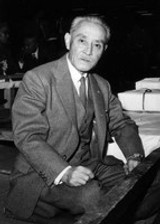Kyuzo Mifune

“A Judo God”

Kyuzo Mifune 1883-1965 is categorized as one of the greatest exponents of the art of judo after the founder,Kanō Jigorō. He is considered by many to be the greatest judo technician ever, after Kanō.
He began training at the age of 15. After 15 months of training, Mifune achieved the rank of shodan in Kodokan judo, and after the remarkably short time of four more months, nidan (2nd dan). Through timing and speed, Mifune quickly gained a reputation, and was never defeated at the annual Red and White Kodokan tournament. By 1912, he was ranked rokudan (6th dan) and an instructor. He was already being called the 'God of Judo.
In the next 20 years, Mifune's reputation continued to grow.He was a great competitive judoka and fighter. He won the 1st All Japan Championship in 1930, a celebrated challenge match at the age of 40 with a sumo wrestler 6’ tall and 240 lbs. Mifune, 5' 2" tall and 100 lb., finally slammed the wrestler with his trademark 'airplane' throw (kuki nage or uki otoshi). He ate sparingly, slept on a Western-style bed, and did not smoke.
 Mifune taught at the Kodokan where he
became Chief Instructor, and taught at numerous universities, police
departments and military academies. In
1937, Kano promoted Mifune to the rank of kudan (9th dan). With Kano's death in
1938, Mifune became the most influential instructor.Students had long complained that Mifune
would get carried away with lectures, and he was "feared more than loved”.
On May 25, 1945, he was promoted to Judan
(10th dan), the fourth of 18 judoka to ever be so honored.
Mifune taught at the Kodokan where he
became Chief Instructor, and taught at numerous universities, police
departments and military academies. In
1937, Kano promoted Mifune to the rank of kudan (9th dan). With Kano's death in
1938, Mifune became the most influential instructor.Students had long complained that Mifune
would get carried away with lectures, and he was "feared more than loved”.
On May 25, 1945, he was promoted to Judan
(10th dan), the fourth of 18 judoka to ever be so honored.
In 1956, he wrote his classic book, The Canon Of Judo, still a remarkable exposition of judo history, philosophy, and technical description. The book covers almost all Kodakon recognized techniques, and adds variations and new techniques. It covers the 15 kata developed by Mifune to teach adaptation through reversals and counters. He teaches the difference between judo and jujitsu, the role of competition in Judo, and the purpose of free practice. He includes in the throwing techniques balance breaking, positioning, and execution. Basic concepts of technique, such as body control, and adaptability are covered. He cautions not to place hope in finding a secret technique. “Polish the mind through ceaseless training, that is the key to effective technique.”
Mifune had two strong guiding qualities: the first was his tremendous love for Judo, and an abiding gratitude for the opportunity to train. Mifune was short and slight, physical qualities that made him both fast and difficult to throw, and his injuries forced him to explore aspects of his training he might otherwise have missed. His second quality was his kindness to students and a sincere interest in their well-being and progress.
Along with other great teachers of his time, ( Morihei Ueshiba O’Sensei, Dr Jigoro Kano, and Gichin Funakoshi), he taught that training in the martial arts was not just about winning. That the real purpose of judo is not to win only, but to personify the truth contained in judo (cannon 24). He often reminded his students that Judo was about perfecting one’s character. His teaching stressed the importance of unbalancing the opponent, a constant striving to perfect one’s technique, the strategy of allowing one’s partner to move first, and to never give up.
Mifune received many awards, and citations, including The Order of the Rising Sun from the Japanese Government. He was active in judo throughout his life, including acting as a referee in the Tokyo Olmpics, less than one year before his death. In 1971, six years after his death, Professor Mifune received perhaps his greatest tribute. A bronze statue was unveiled at the ribbon cutting ceremony of the Mifune Memorial Centre, attended by his wife and family. The Hall is a training centre for young judo students, located in his birthplace, Kuji.
Mifune was a precise and motivating writer. His words are words of wisdom, support, and direction. They are interspersed throughout his writings and actions. His words are a legacy to all martial artists, judoka, and fellow travelers:
‘Never stop training. If my opponents train
one hour, I will train two. If they train 2 hrs,
I will train three….’
‘Do not lose self-confidence. Seven times down,
eight times up, never give up.’
‘Enter a state of ‘no-self no-mind’.
…Kyuzo Mifune
